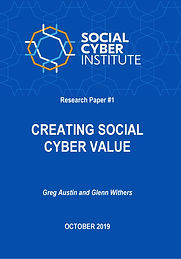SOCIAL CYBER INSTITUTE RESEARCH
Here are discussion papers and research products published under the Social Cyber institute
listed from the most recent to the oldest (click a title to scroll down automatically)
-
Cyber Civil Preparedness and Resilience: Twin Strategic Imperatives
-
Crowdsourcing an Australian Cyber Intelligence and Information Militia
-
Evaluating Australian Cyber Policy Reform: Urgency, Coherence, and Depth
-
Valuation of Reputation Damage for Transport Cyber Attack: Methods and Findings
-
Valuation of Reputation Damage for Transport Cyber Attack
Additional research product can be see on dedicated pages.
This new report analyses a major shift in Australian cyber policy: recognition of the need to prepare for a national cyber catastrophe announced on 1 June 2025. Two of Australia's most experienced analysts in the field, Gary Waters and Greg Austin, call for more rapid and comprehensive reforms to reflect this dramatic change. The focus on the relationship and differences between cyber civil preparedness and national cyber resilience. Click here for the report and here for the press release.
Here is the link to the version of the report released to the media on 23 July.
In March 2022, Australia announced the biggest expansion and upgrade of its cyber capabilities for national security and intelligence at any time since creation of its national-level signals intelligence organisation in 1947. In 2024, the government announced a superseding capital investment program in cyber and space platforms that appeared to be more than double the 2022 commitments in that budget category. The Russian invasion of Ukraine in February 2022 provided a political opportunity to announce the initial radical surge in spending but that war was not the main cause of the expansion. Announcements by the government on the purposes of the surge have been quite apolitical and reveal a heavy focus on what advancing technologies might dictate in intelligence and military affairs. The implied message was that Australia needed to do more to keep up with its major allies in cyber capability. In political terms, there were likely three main geopolitical motivations or drivers for the Australian cyber surge: containing foreign interference in Australia, the need to deliver new levels of cyber operations as part of the AUKUS reorientation and strategic uplift, and the government’s exaggerated view of deteriorating strategic circumstances in the Indo-Pacific. The scale alone of Australia’s cyber surge dictates a corresponding doubling of effort in oversight of ASD activities by parliament and the public, especially in respect of the agency’s apparent intent for expanded operations inside Australia.
Australia’s cyber environment is under constant attack. The threats are multifaceted and growing. Beyond the well-known cybercrime and cybersecurity challenges, we face a barrage of online mis- and dis-information aimed at undermining our social cohesion. Despite increased emphasis on the cyber domain, our existing public and private capacity is likely insufficient to counter the full range of threats we face in cyberspace. Against this background, Australia must adopt a whole-of-society approach to the defence of the cyber environment. This discussion paper seeks to canvass options for an Australian ‘cyber intelligence and information militia’; that is, a ‘crowdsourced’ civilian volunteer cyber reserve capability fit to engage in open-source intelligence (OSINT) and information warfare. Such a resource could play an important role in supplementing existing or developing capabilities.
The Australian government is preparing a new cyber security strategy to cover the period 2023 to 2030. As part of the deliberations, it called for submissions on key issues, including an evaluation framework for the new strategy. This paper responds to that call. It offers reflections on a system of benchmarking and assessment by which the strategy and its implementation can be judged. In doing so, the paper offers a critique of existing approaches as the country wakes from what the government has called a ‘cyber slumber’. Three factors will be central to the success of the new commitments—a sense of urgency, a commitment to coherence between policy pillars, and investment of political capital for deep reform in individual pillars. All three factors (which we can also take as indicators of performance) depend on shared leadership by governments, industry, and community actors (especially educators).
This paper analyses the issue of reputation damage for transport cyber-attacks. Cyber-security attack has become an increasing focus for much business and government planning. Transport infrastructure networks are of special concern. A challenge in responding is to determine the level and allocation of cyber-security budgets. Extensive public sector involvement means that market measures of net benefit may be insufficient for government decision-makers. For example, government reputation effects will also be regarded as important, and so this paper uses focus group methods to demonstrate how project evaluation can incorporate public reputation damage measures. So called "contingent valuation" methodology is applied for this purpose in the paper, generating illustrative "willingness to pay" estimates for public reputation.








